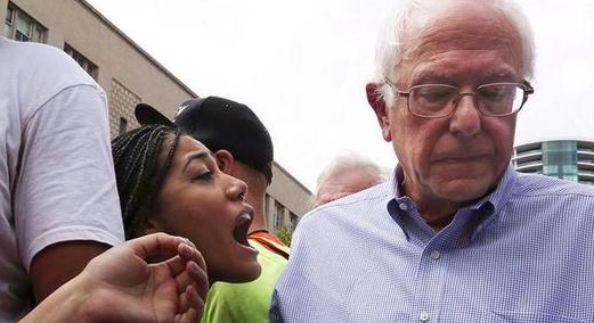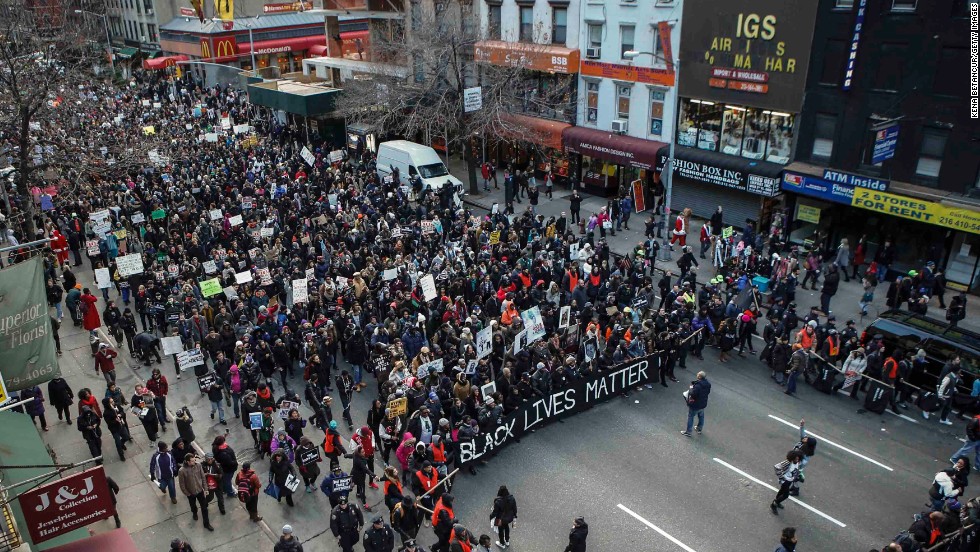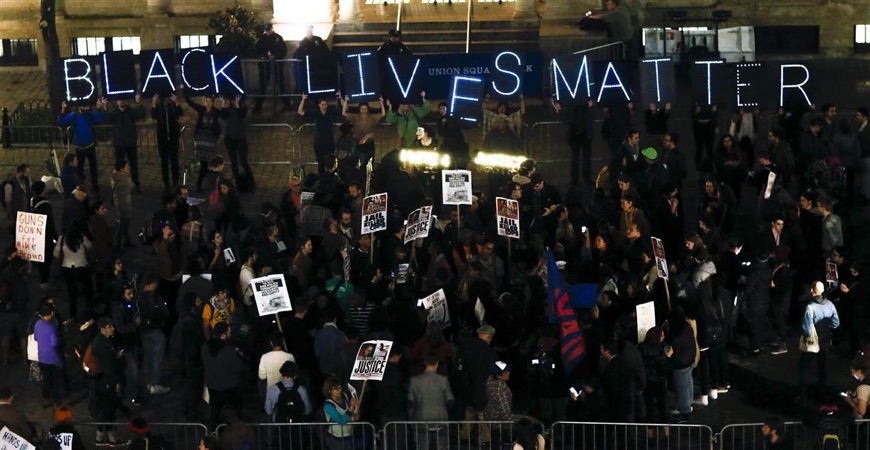During the week of August 9, protests shook the streets of Ferguson, Missouri, still echoing with the shots that killed Michael Brown a year ago. Once again, the State reared its ugly head and brought “order” with tear gas, mass arrests, and a lockdown of the city, implementing another “state of emergency.” That week in Seattle, two young women who identified themselves as members of Black Lives Matter (BLM) took the stage at Bernie Sanders’ rally and made a memorable intervention.
Marissa Johnson, 24, faced the crowd of an estimated 5 thousand people and demanded a moment of silence in memory of Mike Brown and all the Black lives lost to police brutality that year. Johnson condemned the blood at Seattle’s roots: its history of entrenched racism and genocide of indigenous people, the school-to-prison pipeline, and the escalating gentrification and poverty disproportionately affecting people of color. Her speech met with some cheers, but also a great deal of booing and shouts to “get off the stage.” Some even yelled for her arrest.
Over the last month, BLM interruptions of public events — from Sanders’ “social security and medicare” rally, to Jeb Bush’s Las Vegas campaign event, to the protest-turned-“closed-door-meeting” at Clinton’s New Hampshire stopover — have spurred the usual social and corporate media drivel and sparked debate within the U.S. left.

All Hail the Democratic Party
Progressives’ response ranges from googly-eyed praise of BLM’s brazenness to outright condemnation for targeting Sanders, the only self-identified socialist among Democratic Party (DP) candidates. In her editorial, “Why Saturday’s Bernie Sanders Rally Left Me Feeling Heartbroken,” Washington State Senator Pramila Jayapa argues that the BLM youth and their rage should be seen through the lens of deep-rooted, systemic racism and marginalization. However, she conjures a familiar pragmatism that posits the BLM as left-wing Democrats who can force DP candidates and electeds to respond to the concerns of people of color and ultimately broaden its base.
Writes Jayapa, “I would love […] for the Sanders campaign and BLM nationally to sit down and talk about an agenda on racial justice that he can use his presidential platform to help move. Imagine rolling out that agenda and inviting Black people to talk about it on stage with him. Now that excites me.” Thus, she lays out the strategy: political integration of the BLM leaders into the logic and system of the status quo under the auspices of the Democratic Party. Taken as evidence for this theory is Bernie Sanders’ recent incorporation of a racial justice program into his platform, which previously lacked any mention of police brutality.
Hip Hop artist Jay Smooth sees the BLM agitation as a catalyst for bridge-building between those who fight for racial justice and those who fight for economic justice: “There has been a gap for decades from lefties who think that economic justice automatically covers racial justice and those who think that racial justice is actually a thing on its own. This pressure from BLM has gotten Bernie Sanders to bridge that gap.” The emphasis on integration positions BLM as an agent that siphons people into the base and political agenda of the Democratic Party. BLM disruptions solely push Democrats to adapt anti-racist rhetoric.
The frustrated Clinton disruption in particular exemplifies the error of appealing to the Democratic Party. BLM leaders have called on the Democratic Party nomination candidates to denounce institutionalized racism. Hillary Clinton is more than happy to proclaim, “Black Lives Matter,” but these words fall flat, as they come from a politician operating within the government’s core for over two decades. During that time, social programs like welfare and unemployment insurance have been deliberately dismantled, creating rising inequalities and hardship for working class people, blacks, immigrants, and elders in particular. Furthermore, Clinton has been complicit in the expansion of the racist incarceration system.
A closed-door meeting with Clinton or any other representative of the establishment parties will not bring us any closer to ending racism, but will only help them pose as progressives. There is no “convincing” the Democratic Party of leading a movement against racism.
BLM, Sanders Supporters and the Democrats: Friends and Enemies
First off, we need to define who stands against us. Who maintains the brutalizing role of the police? Who perpetuates and escalates the displacement of people of color? Who makes working-class families pay for the economic crisis brought on by the rich?
BLM activists are organizing against police murder, harassment and anti-Black racism. Most of those who rally behind Sanders are frustrated with the reactionary policies enacted by both parties over the last several decades. Compared to the Obama and especially Bush administration, Sanders’ proposals seem like water in the desert.
Both the Republican and the Democratic Parties are enemies of Blacks and the working class. Both parties keep within their ranks the police chiefs and local electeds who sanction the murder of unarmed Black people. Both parties have passed laws that expanded the criminalization of Blacks, immigrants, and the poor. The monstrous prison system and today’s incarcerated population of 2.2 million was created under Republican and Democratic Party administrations. Bill Clinton’s passage of the 1994 Omnibus Crime Bill put limits on appeals for people on death row and is seen as a precursor to the Patriot Act. Clinton also repealed the Glass/Steagall Act created after the 1930’s financial crisis, which many have argued led to the current economic meltdown.
The Democrats’ funders are international banks that rob the homes of workers and people of color. The Democratic Party and President Obama represent imperialism worldwide, including the occupation of Palestine and the bombing of African countries. Presidential candidates from both parties, including Sanders, support Israel’s genocidal atrocities against the Palestinians, African immigrants, and African Jews. In contrast, many U.S. leftists and Black activists have protested and joined in solidarity with Palestine
Bernie Sanders, who is “nothing more than a social democrat” has also voted to extradite Black political activist Assata Shakur, former member of the Black Panther Party. A well-known participant in the Black liberation, anti-war, and students rights movements in the 1960s and 70s, Shakur was falsely convicted — and shot twice during her arrest — for killing a police officer. Today, she is a political refugee living in Cuba.
What’s the Strategy?
Many left groups and intellectuals have begun to interrogate the BLM’s implicit strategy. An [article in the Socialist Worker ->
http://socialistworker.org/2015/08/12/black-lives-matter-and-strategy] correctly calls for a sober examination of the interruption-tactic against a revolutionary strategy. The article points out that the Dems, who lay claim to the vast space left of their GOP rivals, constantly alter their discourse to capture votes from the working class and oppressed. Most leftists recognize this as maneuvering to win elections, rather than any real grappling with economic inequality, racial and gender oppression, or anti-immigrant policies.
But then, their proposed strategy echoes the dogma of the establishment: “[C]hallenging Sanders on these issues is an imperative for our movement. It matters what platform Sanders ultimately runs on because it will shape the political terrain on which we struggle in the streets for the next election cycle, and because a changed political climate may hasten reform victories that can embolden the movement and broaden the horizons of what masses of people believe is possible” [emphasis added]. Are reforms passed down by elites supposed to inspire and direct a revolutionary movement? Here, the Dems are painted as the “lesser and necessary of two evils.” Forgotten is the DP’s complete matrimony with the GOP to expand prisons, wage imperialist wars, close down schools, privatize public assets and programs, and protect the accumulation of wealth and power for a narrow elite.

The question of strategy is a question of where change will come from and where revolutionary forces lie. These forces do not include the bourgeois Democratic Party or “socialist” candidate Bernie Sanders. To suggest as such is to feed a reformist fantasy, and to mistake enemy as friend. Workers, radical social movements, and rebellion from below are what historically have impelled revolution and progressive social change. The “victories that embolden the movement” are those that unite the working class, not those that serve the movement to bourgeois parties on a plate.
Building an Independent, Anti-Capitalist Force
The BLM movement has been highly decentralized and spontaneous. It houses strong reformist tendencies along with some radical elements. In the tactics and speech of BLM activists, we can observe the vacillation between breaking bread with the DP to rebuking the two-party system in its entirely. Said Seattle activist Johnson, “I personally don’t support any of the candidates…Our politicians don’t work for us, our Congress doesn’t work for us…Why do we settle for a system that we know doesn’t work for us when our lives are literally on the line?” This is an idea that is brewing among activists within BLM.
The BLM movement has the potential to broaden popular understanding that the Democrats and Sanders will not solve our problems.
Those youth and organizers who see clearly that the bourgeois parties are not our allies should stand firmly on this political ground and fight for an anti-capitalist direction. The rejection of any alliance with the Democrats is the basis for advancing people toward a working-class consciousness and revolutionary strategy.
We must form a united front of the working class to fight against police brutality. The vast majority of people who have protested against police brutality this year are working-class, black and poor. Black women and trans, queer youth have been at the head, challenging patriarchy and heterosexism in bold ways. Included in this is the undocu-queer movement that has used similar disruptive tactics against mass deportations and against heterosexist bigotry. These same people can bring the fight to their jobs, schools, and unions. In the past, we highlighted the example of University of California employees who organized within their Local 2865 and [called for the AFL-CIO to expel police unions ->
https://www.leftvoice.org/No-Place-for-Cops-in-Our-Unions]. The ILWU Local 10 port shut down against police terror is another example to follow. Although union bureaucrats opportunistically accept police as “working class” and almost always line up behind the Democratic Party, rank-and-file workers should not follow suit.
We can struggle at the workplace independently of union elites and build anti-racist class unity. We can shut down our factories, refuse to operate the machines, and strike when we hear of another police killing. Thus, we can struggle against racism at our jobs and bring clarity to the question of the police, the repressive arm of the state.
By uniting street and workplace struggle, we can begin to unleash the power of the working class.













